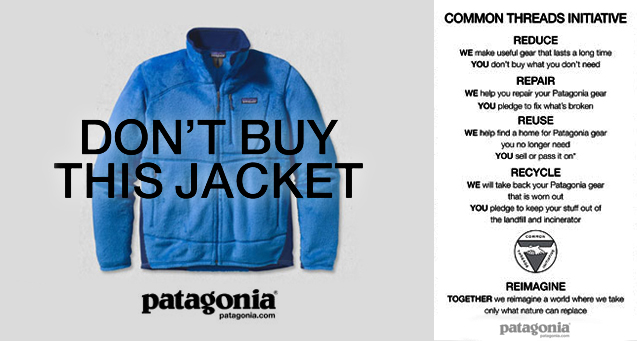I’ve been writing about the Circular Economy a little recently, and how the future of business needs to move from a linear model to a circular one where everything is reused. This isn’t some theoretical business idea. There are a number of companies that work on this basis already, and others in the process of transformation. One of the best examples is Patagonia.
Patagonia is an outdoor clothing company. It’s a private company rather than a shareholder corporation, so it has more freedom to do things differently. It has always had sustainability as a core part of its strategy, and has built the four Rs into the core of its operations*.
- Reduce – Clothes are made rugged, eliminating waste by designing things to last. They’re also designed with function rather than fashion in mind, so that they can be worn for a long time without looking dated. The company also encourages customers to only buy what they will wear.
- Repair – Secondly, Patagonia have a repair system in place for fixing up any damaged items of clothing and returning them to you. Clothes are deliberately designed with matched durability, so that one part shouldn’t fail while the rest of the garment is fine.
- Reuse – If you no longer need a Patagonia branded item of clothing, you can donate it or resell it. Patagonia shops include a ‘second home’ area to resell unwanted items, and there’s a partnership with Ebay to encourage customers to see if there’s a secondhand item before they buy a new one. Their own factory seconds and unsold products are donated to disaster victims.
- Recycle – Every item in the current Patagonia range is recyclable. They will take back any of their products at the end of its life, including shoes and rucksacks, and break them down for recycling.
What I like about this effort is that it recognises that doing business sustainably is a partnership between the company and the customer. It requires a little time and consideration from the wearer (the word ‘consumer’ just doesn’t apply here), and Patagonia are actively seeking to change the relationship that people have with their possessions. It works for the environment, customers value their gear more. And it’s not bad PR either – the unorthodox adverts that Patagonia have placed, like the one below, have been a great way of getting people talking about the brand.
The question then, is how replicable this sort of thing might be. In many ways Patagonia have an advantage in being an outdoor clothing company – outdoorsy people are more likely to be interested in the environment, so it’s on message for your audience. You don’t expect to buy a new waterproof jacket every year, so making things to last is a good selling point. They’re also a premium brand and can price in these environmental and social considerations without losing customers.
Plenty of other companies can do this, and sportswear brands like Puma have been experimenting. Others might find it harder, especially in the world of high street fashion. Many brands rely on cheap labour and rapid seasonal turnover, so these sorts of measures just wouldn’t be economical. But then, if it’s impossible to do business without environmental degradation and sweatshop labour, then I’d suggest that business shouldn’t exist in the first place.
*Corporate responsibility isn’t just about the environment of course, and Patagonia have a section of their website dedicated to supply chains and transparency. It’s unusual for it’s detail and it’s honesty (they admit that they took their eye off the ball as they expanded in the late nineties, and had to catch up again). You can also download a list of the factories where their clothes are made, so that their corporate responsibility claims cans be verified.


Jeremy – I like Patagonia’s strategy and lack of footprint they cast on the world. It is unfortunate more companies do not subscribe to this idea. We have limited natural resources after so many years of uninterrupted depletion. WIthout a plan going forward we will either have to create these resources or pay igher sums for them.
I have heard about Patagonia before, but haven’t invested yet in one of their products, as the prices are a bit over my budget. I didn’t realize they took items back when you weer done with them, or repaired them for you. Maybe I should make the effort soon to make that one time investment in a good winter coat.
Love your posts.
Drive straight down end includes lovely container contour inside protecting used louis vuitton handbags signature bank. You can easily place your lip gloss, coins and also cellular telephone in it.